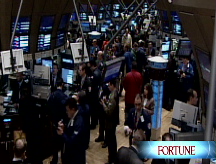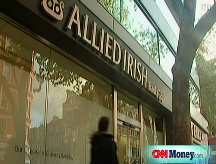Groundhog Day on Wall Street
The stock markets had their worst January ever -- and February is not off to a good start.

 |
| The S&P 500 suffered its worst January ever last month. But its loss paled in comparison to the pummelling that the KBW Bank Index, a key gauge of bank stocks, took. |
NEW YORK (CNNMoney.com) -- Punxsutawney Phil saw his shadow this morning. Does that mean another six weeks of horrific stock-market losses?
The worst January for stocks in history is over. But so far, February is looking no different, with the Dow and S&P 500 each falling about 1% early Monday morning before recovering as the trading session wore on.
Forgive investors if they feel like Bill Murray's character in "Groundhog Day." Every morning, they wake up and it seems like the same old day all over again. Bad economic news. More layoffs. Companies reporting disappointing financial results.
The crisis facing the nation's banks lies at the heart of the problem. There was hope as the year begun that the worst was behind us, but that clearly has not been the case.
Citigroup (C, Fortune 500) lost more money than expected and announced it is breaking into two. Bank of America (BAC, Fortune 500) needed another $20 billion from the Treasury to help it get over Merrill Lynch-induced indigestion. Six small banks have already failed this year.
The KBW Bank Index plunged 35% last month, far worse than the S&P 500's 8.6% slide.
So is there any way for the market and economy to improve as long as banks remain in critical condition?
In a word, no.
"It is not likely a coincidence that the S&P 500's recent high was on Jan. 6, which corresponds with the recent high of the financials sector," wrote Bill Stone, chief investment strategist with PNC Wealth Management in Philadelphia, in a note to clients Monday.
"Financials are important because it is difficult...to have a properly functioning and productive economy without a financial system capable of providing credit to the system," Stone added.
The biggest problem right now is that private-sector investors are unwilling to help banks out. Individual investors have shunned financial stocks, and with few exceptions, large investment firms, such as private equity shops, are also avoiding the sector.
That means that governments have to play the role of capital provider.
The U.S. Treasury and Federal Reserve, as well as central banks around the globe, have taken unprecedented actions over the past few months. So far, this has done little to improve sentiment.
To be sure, steps taken by the United States, such as capital injections in banks and the Fed's attempts to bolster the market for mortgage-backed and other asset-backed securities, could eventually lead to a stabilization of the sector.
In a note to clients last week, Pierre Lapointe, market strategist & quantitative analyst with National Bank Financial in Montreal, wrote that "while the outlook for banks remains challenging, there are notable differences between their position today and their position at the height of the credit crisis last October."
Specifically, he pointed to credit spreads being much narrower now than they were shortly after the collapse of Lehman Brothers. But until investors are able to stop worrying about the toxic assets that remain stuck on many banks' books, it will be tough for the markets to recover.
"Equity markets are unlikely to rebound sustainably unless financials are part of the action. In every one of the last five end-of-recession rallies, banks have led the rest of the market," Lapointe wrote.
What's more, even the economic stimulus package currently being debated in Congress might not be enough to restore faith in the nation's banks.
"If we get a stimulus package out of Washington, it could result in a market rally, but that would only be a bridge until when the banking system functions more normally," said David Joy, chief market strategist with RiverSource Investments in Minneapolis. "Unless banks are lending, I don't see how you can have a sustainable economic recovery".
In an interview Monday morning, PNC's Stone added that confusion about what the Obama administration will unveil in its plan to improve the controversial bank bailout plan, the Troubled Asset Relief Program, or TARP, isn't helping.
The uncertainty about what may or may not be part of a new program is contributing to the selloff in bank stocks, he said. There have been hopes that the government will revisit the original intention of TARP and set up a "bad bank" to buy up the spoiled assets.
But it's not clear if the government and banks will ever be able to come to an agreement about how much to pay for the assets. Some even fear that the government may be forced to nationalize a bank if economic conditions deteriorate further.
One economist said that economic stimulus could help troubled banks -- even if regulatory policy is ineffective. "A healing economy could help heal the banks. You wouldn't have defaults and delinquencies rising as fast. So the toxicity of assets wouldn't be as intense," said Alan Levenson, chief economist with T. Rowe Price, a money manager based in Baltimore.
Levenson pointed out that many savings and loans that failed in the early 1990s were still being cleaned up even after the 1990-1991 recession ended. So it's possible for the economy to turn before banks are fixed...although he conceded that might slow the recovery.
Still, until there is more news about what the Treasury, Fed and FDIC plan to do with banks, even if it's something as drastic as nationalization, the market and economy will be probably continue to be held back by worries about banks.
"You really need to get some concrete definition on where the government is going with some sort of plan for banks," said Bill Knapp, investment strategist with MainStay Investments in New York. "It's too big of a psychological impediment to get past until we get clarity about the plan -- good, bad or indifferent." ![]()



